Below is an account of the visit by an international parliamentary delegation of 33 elected representatives and a number of their advisors to Catalonia, hosted by DiploCat, during the Catalan referendum. While the delegation programme lasted for several days, this account covers only Sunday October 1, polling day. This is not a political analysis of the Catalan referendum but my personal account of what we witnessed.
I left my hotel at 7am on Sunday morning to meet up with the international parliamentary group and our DiploCat hosts. It was still completely dark and pouring rain but I knew thousands of people would have been gathered outside polling stations since 5am to defend them from police attempts to shut them down, which had been rumoured the day before to be scheduled to begin at 5am or 6am.
The international visitors were scheduled to leave in 10 small groups from a central meeting point at 7.30am. I was in a group with Sinn Féin Senator Trevor O’Clochartaigh, Swedish Green MEP Bodil Valero, Welsh member of the Westminster Parliament for Plaid Cymru, Hywel Williams, and Magni Arge, a member of the Faroe Islands and Danish Parliaments for the left pro-independence Republic party. We spent the day with our helpful DiploCat host, a young woman called Irina.
The official plan was to visit three or four polling stations in Barcelona and the surrounding towns; meet the mayor of Solsona for lunch at 1pm; then return to Barcelona by 4pm.
Sarrià-Sant Gervasi
Our first stop was a polling station at a school (Col·legi Orlandai) in the Barcelona suburb of Sarrià-Sant Gervasi, close to Gràcia, where two of the international groups, or around 10 observers altogether, arrived at 8am. It was bright by then and the rain stopped temporarily. Hundreds of people were gathered outside the school, whose entrance gates were closed. They cheered when we arrived, seeing our ‘international observer’ lanyards.
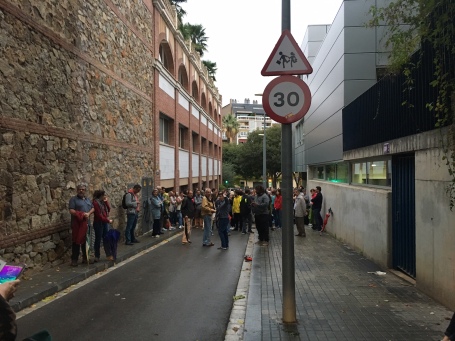
Approaching the polling station at Sarrià-Sant Gervasi
Two uniformed members of the Mossos d’Esquadra, the Catalan autonomous police, stood at the edge of the crowd and observed.
We started to speak to some of the voters gathered, sometimes in English and sometimes having the conversation translated by Irina or by Bodil from Sweden, who has fluent Catalan. They said the Mossos had earlier informed them they had been instructed to prevent voting, but that they did not intend to, in the interests of protecting public order and public safety.
Trevor suggested we speak to the officers. I hesitated for a second, not being a big fan of police, having both experienced and witnessed police violence at peaceful public gatherings and rallies on several occasions. But we went over to introduce ourselves. Both were polite and friendly, and chatted comfortably with us in English. One of them, finding out Trevor and I were Irish, told us he had lived in Dublin for close to a year. I asked if it was okay if I took a photo of them speaking to Trevor and they replied, “Of course it is”.
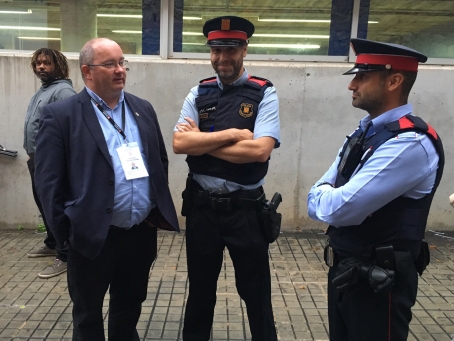
Sinn Féin Senator Trevor O’Clochartaigh chats with the two Mossos officers at Sarrià-Sant Gervasi
Some of the assembled voters told us the majority of the crowd had been there since 5am, and that the school was one of those that had been occupied since Friday afternoon. The parents of the kids who attended the school had slept inside the school building on the Friday and Saturday nights. There were three or four young women half-asleep on thin mattresses just outside the building, under the shelter of an overhanging roof. People carefully stepped over them, as did we.
Just then, at around 8.15am or so, the parents began to exit the school building into the waiting crowd, carrying their mattresses and sleeping bags, to cheers and applause.
Internet shut down
Some of the organisers then invited us to come inside the school, and we squeezed through the voters to walk through the gate. The front rooms were set up with desks for ballot papers and ballot boxes, and around a dozen volunteers were working intently on computers and laptops. Voting was due to begin at 9am but their electronic electoral system was down and the entire internet seemed to be down too.
I tried to get online on my phone when inside the school and couldn’t – sometimes my phone would say ‘No service’ but even when it didn’t, I was still unable to use the internet. I couldn’t get online for hours that morning. It was the same for the other visitors, though some of them seemed to be able to get online for two or three minutes at a time. Outside, one of the organisers called on the voters to all switch their phones onto airplane mode in the vain hope that it was a capacity overload problem, a request everyone quickly and willingly cooperated with.
Someone told us the polling station staff were attempting to get online by using a Belgian proxy; it didn’t work though. We heard through text messages that not only the electronic voting system was down, as was expected, but the entire internet was down at a number of other voting stations too. “Do you think it’s the Spanish government that’s responsible?” I asked one of the frazzled volunteers. She looked at me as though I were a moron and said, “Of course it is.” We both had to laugh.
The voters outside were patient and cooperative, occasionally breaking into chants of “Votarem! Votarem!” (“We will vote!). We could see each other through the gates; organisers outside communicated constantly with those inside, and passed phones, coffees and mini-pastries through to the volunteers. Bodil did an interview with a Swedish journalist holding a recorder through one of the gaps in the gate.
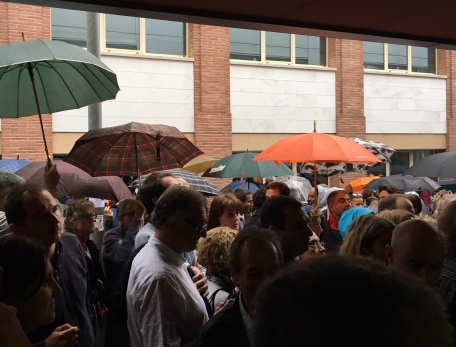
Voters wait in the rain
When it rained, the voters shared large umbrellas through the crowd. At one stage an organiser was lifted on top of someone’s shoulders to call on the voters to clear a path for the elderly, people with special needs and people who had to go to work that day to be able to come up to the front and vote first. Two older women were brought into the school building so they could sit down; an elderly, frail man refused the offer of coming inside and continued to stand outside at the front of the queue using his umbrella to help support himself.
It was at that point that texts began to come through saying there had been attacks by riot police on other polling stations in Barcelona, including some that were close-by.
Shortly before 9am, the two Mossos officers entered the school building, with voters clearing a path for them. They asked the volunteers to assemble so they could speak to them all together. The international visitors hung back but within hearing distance, and Irina and Bodil translated for us.
The Mossos informed the workers that the National Police was attempting to close several polling stations in Barcelona. They repeated what they had told us and the voters earlier; that they had been instructed to prevent the vote from proceeding, but that they were not going to, as their intention was to act in the interests of preserving peace, public safety and public order. They added that if the Spanish police arrived, they would not be able to intervene, but that they would try to act as mediators between the Spanish police and organisers.
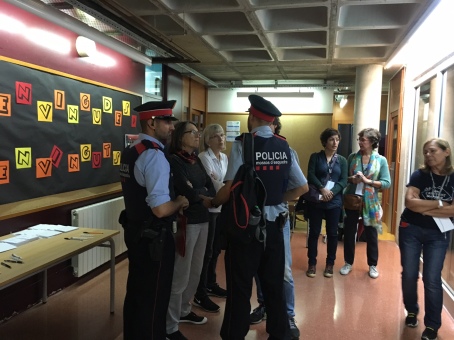
The Mossos officers talk to polling station workers
One of the Mossos then approached the seated older women, crouching down to ask if they were feeling okay, and offered them water. Then they left through the gates, to applause.
The first votes
The volunteers resumed working to resolve the internet problem. I remarked to one of them that the voters assembled outside were incredibly patient, waiting for hours in the rain; no-one was acting annoyed or frustrated at the fact that the polling station was still closed at 10.30, an hour and a half after it was scheduled to open. “They have been waiting their whole lives to vote,” she said. “They don’t mind waiting a little longer.” But anxiety about the possibility of a police attack was growing.
The polling station workers thought that if they had computers with older technology they may be able to connect to a wifi system – so people outside ran home to bring in two or three old laptops and an old PC, which they passed through the gates. At around 10.40am a cheer went up inside the building and we all started clapping – it had worked! They were connected.
One man inside excitedly ran to inform the others, through the gate, that they were connected to the internet and voting was about to begin. “I’m going to be the first to vote!” he yelled excitedly, to laughter. The two elderly women and a handful of others inside took up their ballot papers and voted.
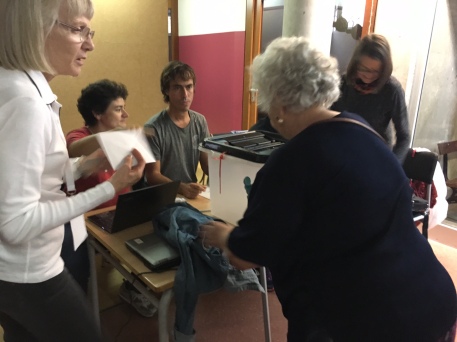
One of the women who came inside to sit down casts her vote
Then the gates opened and the first round of people walked through. Everyone was cheering and applauding jubilantly – the voters outside, the workers inside, us international visitors.
The faces of those who came through were still calm and resolute but some became tearful after they voted. It was a really moving moment, and it’s hard to accurately put it in words. The best way I can describe it to say there was an overwhelming sense of dignity about both the moment and the people.
As the voting got underway, our DiploCat hosts organised the two groups to start moving to our next location; we had been scheduled to leave shortly after 9am but had decided to stay until the station opened. The voters lined up outside the school cheered us and said “Thank you!” in English as we left.
At Manresa
We started driving to Manresa, an industrial province of around 75,000 people in the centre of Catalonia, about 45 minutes outside of Barcelona. We had already seen a small number of videos on Twitter of police seizing ballot boxes and beating voters with batons in the brief moments where anyone could connect to the internet in the polling station at Sarrià-Sant Gervasi.
Now we spent the journey uploading our own photos, footage and observations from the morning onto social media, and passing around phones between the seats so we could all view the latest footage of the police attacks – gasping, murmuring “Oh my god,” and exclaiming “Jesus Christ!” as the snippets of film from the other polling stations showed increasingly brutal violence and rubber bullets being fired into defenceless and panicking crowds. It was not just the National Police we saw in the footage anymore but also the Guardia Civil. Hywel was uploading live videos in Welsh to Twitter, describing our visit.
When we arrived in Manresa centre around 11.30am we stopped for a coffee for a few minutes and stood at the bar with our eyes glued to the TV which was, of course, broadcasting the footage from the polling stations. The building in the square were adorned with colourful flags saying “Sí!” and “Democràcia!”, like in Barcelona, and it had stopped raining entirely. Then we walked to a polling station, a school, where the people queuing outside again cheered as we approached. There were still large crowds waiting to vote as we entered at around noon, and spoke to the polling station workers. The National Police had not arrived at the station; the queues were orderly and the mood bright. Two Mossos stood outside.
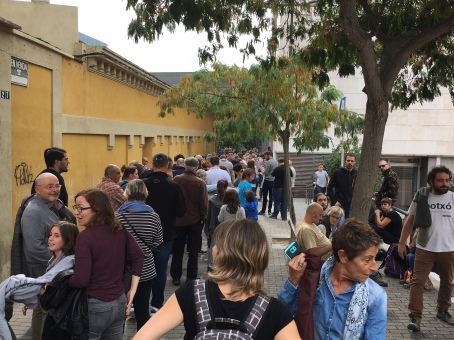
Voters queue up outside one of the polling stations in Manresa
One of the polling station volunteers offered to walk us around to the second voting station open in Manresa centre, which was nearby, and we agreed. During the walk the volunteer said worriedly to our DiploCat guide, Irina, that the route we were taking to the second site wouldn’t show us the best side of Manresa; Irina translated her concerns while laughing kindly. Relaxing, the local volunteer then joked that we were walking down “Las Ramblas” of Manresa.
This station, too, was busy, but calm and orderly, having received no visit from the National Police or Guardia Civil. Each polling station had a ‘president’ – a coordinator or presiding officer. Many of the volunteers were wearing stickers that identified them as both activists of the ANC (National Assembly of Catalonia) and also of ERC (Republican Left of Catalonia). I spoke to the president at this site in English for some time about how the day had unfolded, and he outlined the same difficulties with their voting system and internet access that we had experienced early in the morning.
I asked him if he was a member of any political party as I was curious as to whether the volunteers were all affiliated to political parties or whether there were also unaffiliated community members and activists. Almost apologetically, he said he wasn’t a political activist, but worked in IT – and that his mother, an ANC activist, had called him the night before to say they needed people with technological expertise as they anticipated hacking attacks. “So here I am,” he smiled.
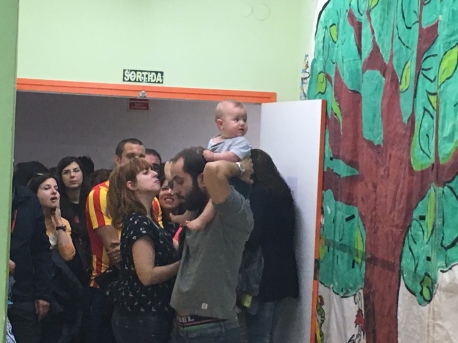
Voters wait their turn to enter the polling station in Manresa
As we left, the crowd queuing outside applauded and started chanting “Thank you! Thank you!”. By this stage we had asked Irina to teach us how to say “Good luck” in Catalan, so we replied “Bona sort!” as we left. I grinned to hear a man in the queue describe us as “briagdistas internacionales” as we walked past; he and his friends laughed and waved goodbye.
Waiting in dread at Sant Joan de Vilatorrada
Irina told us there were fears of a nearby polling station being attacked so we drove to another school at Sant Joan de Vilatorrada, just a few minutes from Manresa centre. The atmosphere was different here, subdued. People queued outside, but quietly. There was no cheering.
Inside, the volunteers told us that the polling station had been attacked violently by the Spanish police that morning, before it had even opened. Witnesses told us that the National Police had used a battering ram to enter, and smashed a man’s finger in the door four times, crushing the bone and severing the tendons. They took the ballot papers, boxes and began attacking the voters outside.
A teenage girl explained to us that her and some other voters had run up to the two Mossos present and asked them to do something; they said they couldn’t intervene but called their superior officer who arrived and had a heated argument with his counterpart in the National Police, after which the Spanish police withdrew. The injured man had left hours earlier to get medical attention so we couldn’t speak to him.
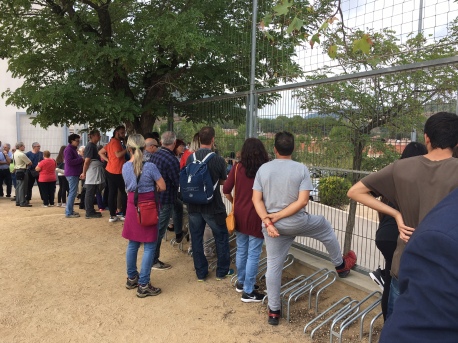
Voters wait anxiously following rumours the police were planning to return to the school they had attacked that morning
The organisers and locals were anxiously expecting the National Police to return – they had received encrypted WhatsApp messages from organisers and activists at nearby stations and on nearby roads who reported they had seen around 60 Spanish police officers in the area. The locals knew they didn’t have the numbers to resist another entry attempt by police. We walked up to a perimeter fence that voters and activists had gathered by, all of us peering through warily. An enormous cheer went up as a number of uniformed firefighters walked up the hill together to the school.
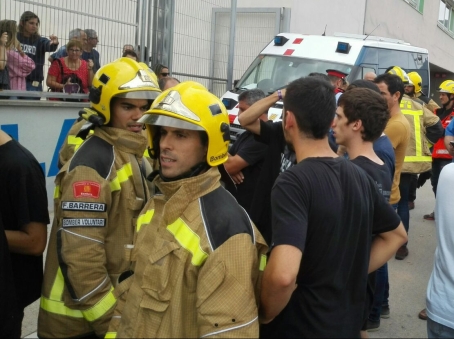
The firefighters who outlined the situation to us. Photo by Bodil Valero.
We spoke to the firefighters and others for around an hour, waiting for the police to arrive, but they never did. One firefighter in particular spoke to us at length, describing his view of the general situation. “I’m not very political,” he said. “But we just want to vote. It’s simple.”
Then we heard through WhatsApp messages that the Guardia Civil had attacked another polling station just a five-minute walk away. The firefighters sprinted off down the road as a handful of teenage boys sprinted off another way, obviously knowing a short-cut. Irina said we should think carefully about whether we wanted to try to catch up with the police, but we all quickly agreed we did.
‘I had my hands up’
Our driver zipped us around to the school that was under attack and we arrived to scenes of lines of around 20 Guardia Civil officers jostling voters who had their arms raised. Several Mossos and firefighters formed a line of their own in between the voters and the Guardia Civil.
The people were peaceful but angrily chanting, “No passaran!”, “Catalunya! Catalunya!”. After a tense and angry standoff of around 15 minutes, the police backed off and left.
We were on the street, and couldn’t see the school building through the crowd, so I misunderstood the situation we had walked into. I thought the Guardia Civil had arrived, realised they were heavily outnumbered, and decided to leave. But that’s not what happened – we had got there too late.
They had already smashed down the glass doors of the polling station, seized the ballot boxes and beat a 70-year-old man over the head with a baton – just because he was in the process of voting. As the Guardia Civil left, he was sitting outside being cared for by other voters.
(Below is footage from @QuicoSalles on Twitter of what happened in the moments before we arrived.)
We had all been separated, but the same teenage girl who had spoken to us at the previous school had come running up to find one of the international observers – my Sinn Féin colleague Trevor – who went and spoke to and filmed the injured man. He had had his head split by the baton. “I had my hands up,” he said. “I was voting, I had my hands up.”
We jumped back in the car based on more WhatsApp messages and tried to get to the next site we believed was going to being targeted before the police did, around five minutes away. People were gathered outside anxiously and some were clearly in shock, having arrived from the same polling station we had just come from.
I spoke in English to a teenage boy wearing a Nirvana T-shirt and told him we had just come from the school. White-faced and shaking, he said he had been inside the polling station with his grandfather when the Guardia Civil had burst in and started hitting people with batons. Every few words he would almost choke, finding it hard to speak. “I need to go home,” he said after telling us what he saw.
The firefighter who we had earlier befriended at the first school we had visited in Sant Joan de Vilatorrada came up to us and told us that the organisers had just shut the polling station voluntarily in order to try to prevent an attack. They wanted to protect people from violence and also protect the ballots they had from being seized. It was around 3.30pm. He told us of their standoff with the Guardia Civil and said that like us, the firefighters had arrived too late to do anything to prevent the attack.
“But the fact that you guys and the Mossos got there stopped them from beating the voters on the street after they had taken the ballots,” Magni, the Faroese visitor, said.
The firefighter wasn’t going to be consoled. “Now they are laughing at us,” he said, meaning it both literally – the Guardia Civil had taunted and laughed at them during the stand-off – and figuratively, as in, they had left with people’s votes. He said the words with such a sense of powerlessness and humiliation that, for me, it was the lowest point of all that we observed that day.
As people began to disperse after the closure of the polling station we got back in the car; one of the volunteers had suggested we could drive to the local Spanish police station to see it, perhaps to try to speak with some of the officers. A number of roads were closed, though, so we couldn’t get there.
We saw one of the empty roads closed off by Guardia Civil vehicles and Hywel wanted to go and speak to them and take photos. I told the others that our phones might be confiscated if we tried to take photos because of the (2015) Spanish gag law that, among many other restrictions, banned taking photos of police officers. We all left our phones in the car and walked down to around eight officers who were blocking the road with large vehicles. Bodil translated our questions for them and their responses. She asked why the road was blocked; they replied that it was because someone had been taking photos of the police, which was illegal.
“Because of the gag law,” Bodil replied, provoking protest at the phrase. They said they were “just doing their job”, but then moved one of their vehicles to clear the blockade of the road. We weren’t going that way anyway, so, to the confusion of the Guardia Civil, drove off in the opposite direction.
At Solsona
We had been due to have lunch with the mayor of the town of Solsona at 1pm and were now at least three hours late. Irina insisted that we had to eat something, so we set off further inland to Solsona, another 45 minutes or so away, though I think it’s safe to say all of us had lost our appetites. Back in the car we took turns charging our phones, and passed around the phones in use to see the latest images and footage of attacks at the polling stations. Hywel delightedly informed us that his press officer told him he was trending on Twitter in Wales due to the updates and images he had been sharing all day, which lifted our spirits a little.
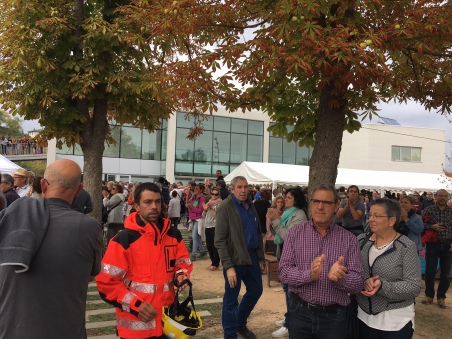
Voters gather outside in tents and with music playing at Solsona
We arrived at the main polling station in Solsona, a town of around 9,000 people in the province of Lleida, at close to 5pm. The mayor, David Rodríguez, and others came out to welcome us. As well as being the mayor of Solsona, David is also a member of the Catalan Parliament for the ERC, the Republican Left of Catalonia. The polling station was striking for how well organised it was.
Two massive tractors formed the main part of a barricade at the entrance of the centre, and another tractor blocked off a smaller way in on the footpath. You could still enter, but only on foot. There were very large crowds of people gathered on a grassy area outside of the building in a sort of festival atmosphere with some music and tents, and several firefighters, who got an enthusiastic round of applause every time they waked from one place to another.
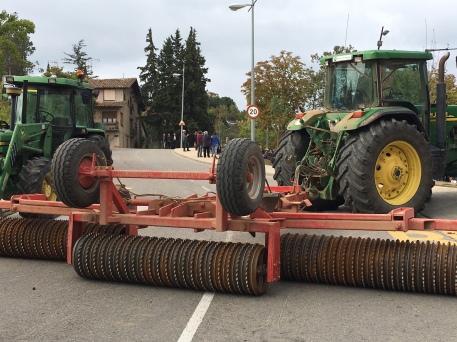
Tractors forming barricades at Solsona
The polling station itself was a large gymnasium-style building. The volunteers inside were on edge and were expecting police to arrive shortly. They were preparing to shut down the station and hide the ballot boxes at the first sign of a raid.
I spoke to one of the volunteers, a young man, at length about their high level of organisation. “We don’t think they will be able to get in,” he said. “We think the doors and walls are strong enough to keep them out, none are made from glass. The only way they could get in is if they use vehicles to smash through the walls.” He paused, realising the absurdity of it, and shook his head, saying, “It’s so strange to talk like this, of vehicles smashing through walls. It’s like a war.”
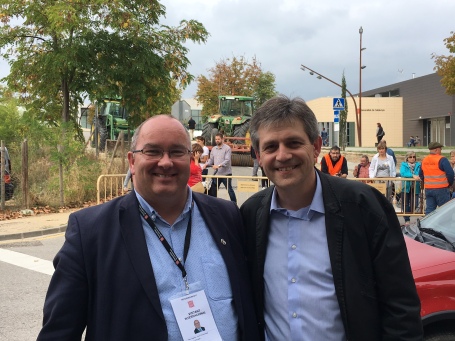
Trevor O’Clochartaigh with Solsona Mayor and ERC MP in the Catalan Parliament, David Rodríguez
He explained to me that they believed there were enough hiding places in the building that they could temporarily hide the ballot boxes if the police managed to enter. They had taken the step of stuffing two ballot boxes with empty envelopes and “hiding” them in an easy-to-find spot.
I laughed at the ingenuity. Everywhere we had visited, people were dealing with the problems they faced collectively, with great creativity and even with humour.
David asked us to come and have lunch at a Japanese restaurant, a couple of minutes’ walk away. We were reluctant to leave as people were expecting the arrival of the Guardia Civil, but he assured us we would all return immediately if we heard any reports of their arrival.
He introduced us to the owner of the restaurant, who greeted us warmly and told us he had moved from Japan to Solsona 27 years ago. Then for 30 rather surreal minutes we ate sushi and talked across the table, finishing with more coffee. The owner’s son, around seven years old and playing outside in an FC Barcelona jersey, kept running up to the window to wave excitedly at us. We grinned and waved back.
David led us back in to the polling station and on the way back I spoke to a young woman who was shortly due to sit examinations to become a judge. She thought there was a good chance that her role in assisting the local referendum process would destroy her chances of becoming a judge, and said that one of her fellow students was too scared to even vote for the same reason. “But it’s worth it,” she said. Having done countless all-nighters for law exams myself I was left in awe.
David told us the organisers were still on stand-by to shut down the polling station. One of our group remarked to him that it must be a difficult decision – to close the polling station early before everyone had had the chance to vote.
“No,” he replied firmly. “There is no question. Our responsibility is to protect these people from violence. If we have to close the voting station early, even if the votes are stolen, the people here will be safe.”
We were scheduled to meet with the rest of the international delegation at 8.30pm to prepare a joint statement about the conditions in which the referendum was held, and both Magni and Bodil needed to get back to Barcelona to do media interviews before that time, so we began the drive back. Irina asked the rest of us if we wanted to take a break or visit another voting site, and Trevor suggested we go to the Josep-Maria Jujol school in central Barcelona – which both of us had visited during the occupation the day earlier. Trevor had also visited it at around 6am that morning and wanted to see how they had survived the day.
Back in Barcelona
There was a huge number of people gathered outside the school, possibly a couple of thousand, and they cheered loudly when we entered. “Gracias, bona sort!” we called back. It was around 7.30pm and they had been undisturbed all day – in my view, because they had the numbers required to deter any police intervention. Excitement was rising that they would manage to make it to 8pm, the end of voting time, without a police attack. Two Mossos walked around the entrance and they too were cheered.
A political scientist who taught at one of the Barcelona universities was the president of the polling station and showed us how they had been dealing with the technological problems in order to ensure the highest electoral standards were maintained.
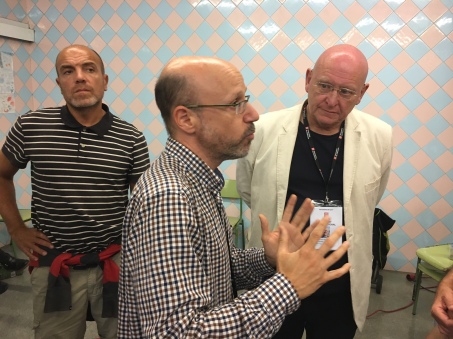
The polling station president (centre) and other volunteers speak to the international guests at Escola Josep-Maria Jujol
“We had people changing our IP addresses every 30 minutes to try to stay ahead of the hackers,” he explained. “If the system was down at any particular moment, we would mark people off on the paper electoral roll but put an asterix next to their name. Then when it was up and running again we would enter their names into the electronic system. So there may have been periods of up to 20 minutes at most where the system was down, but it would be virtually impossible for a person to vote twice at different polling stations in that time due to the queues.”
Inside the polling station I ran into a number of Basque friends who were visiting Barcelona in a show of solidarity. I joked darkly to them that they must have felt the same way right then as Irish republicans did when the DUP formed a coalition with the British Conservatives earlier this year – for a brief moment the world’s media attention shone a light on problems and outrageous behaviour that we struggle constantly to draw attention to. Of course this was on an even bigger scale. They laughed in grim agreement.
The author Liz Castro was also at the school, and interviewed Trevol, Hywel and I about what we had observed as we waited for 8pm. She tried to broadcast it live on Twitter’s Periscope feature, but the internet was too patchy, so she filmed it to upload later instead. At about 7.59pm a rumour spread through the building that the police were coming to seize the ballot boxes, causing a brief moment of panic. A minute later we were assured by the tense polling station president that the rumour was false.
Celebrating keeping the polling station open
At 8pm, a huge cry of celebration went up in the crowd outside and they began to sing the Catalan national anthem. They had made it to 8pm without an attack. The school gates were closed as they sang the final bars. (You can watch my video of this here.)
Inside, photographers and media camera crews filmed the two young electoral officers who began the official count of the ballots.
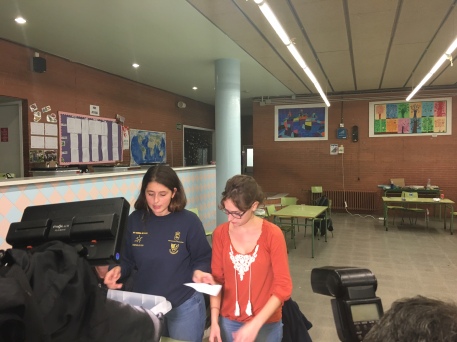
Electoral officers begin the count at Escola Josep-Maria Jujol
I asked the volunteers if they had heard of any plans for mobilisations in Barcelona that evening, saying we had heard that there would be demonstrations in several cities in the Spanish state against police brutality.
“I’m not a political activist,” the polling station president replied, “so I can’t tell you about the mobilisations outside. My role, and one I take very seriously, is to facilitate the vote of the people here today and to defend those votes. But I can say that as a political scientist, the mobilisation of Catalan society is something that is fascinating to see and something that will not disappear overnight. Of course we can’t keep up this level of mobilisation constantly,” he said as other exhausted volunteers gathered around him nodded in agreement, “but this movement is not going anywhere.”
As we left to get to our meeting with the rest of the international delegation, we walked out behind the electoral workers. The people who had defended the polling station all day – and all weekend in fact, for many – again applauded us. You guys are the ones who deserve the applause, we kept saying as we shook their hands. I don’t think I’ve ever made such an understatement in my life.
@emmaclancy123
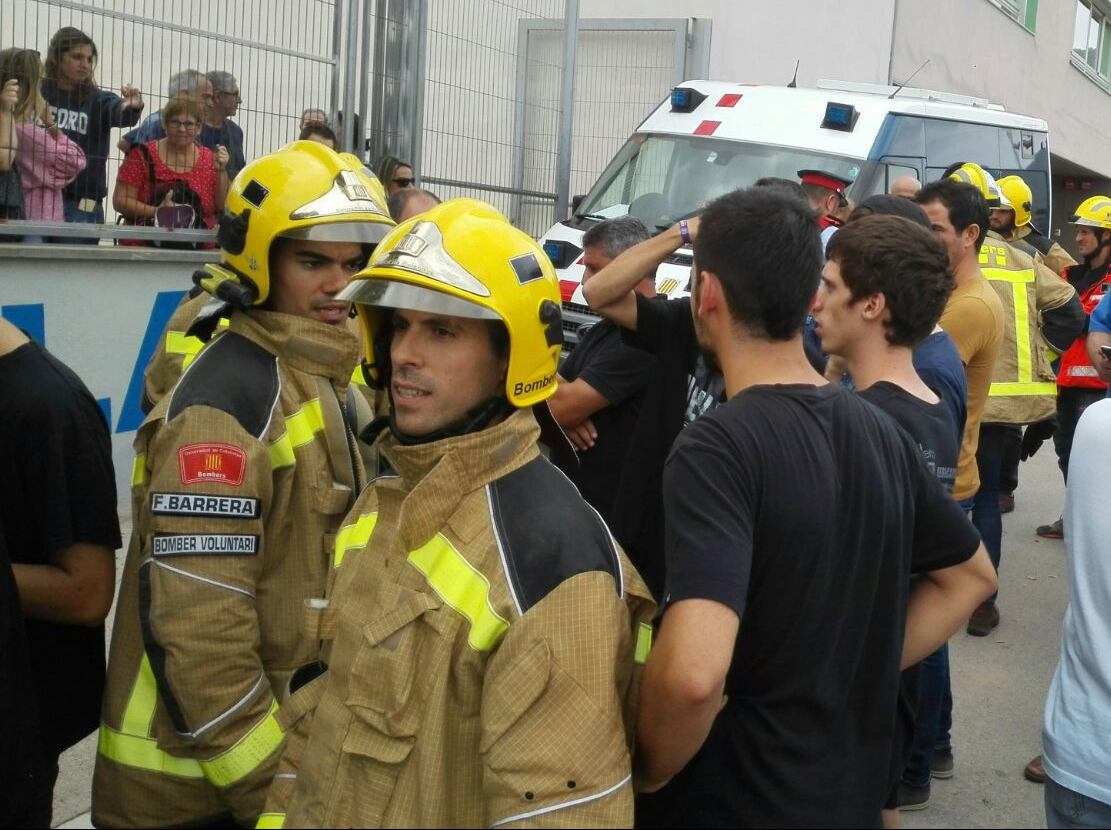
Good one!!!
Thanks for sharing your experience during such an important day for us! You made me cry remembering the feelings we experienced during the day, as I was in one of the voting tables. Some of these feelings were sadness, impotency,… But nobody will take away the dignity we felt when voting and while defending the act of voting itself.
Hope you will visit us again soon!
Thank you for explaining what you saw. The article excites me a lot
Excellent account of events. Thank you for coming and being witness.
Very interesting report! I have a vacation home in Catalonia since 2009 and have followed the struggle for indepence for quite some time. I left Catalonia the day before the vote and followed the referendum via TV 324 over the internet. Visca Catalunya!
Well reported thank you! I am an activist in the California independence movement and we are certainly inspired by the Catalans. I was in Barcelona this summer and got to meet Liz Castro. Waiting for Tuesday, Oct. 9 announcement.
Many thanks, your contribution is much appreciated.
Only one important thing: THANKS!
Thank you to be here with us. I have to say it moved me so, again, remembering by your words what I lived. Go raibh maith agat
Everyone had a role to play. Some built the boxes. Some brought them to the stations. Others hide them when police were coming. Others stood at the door and delayed the police. Some were hit. And you were witnessing all events. Every role was necessary and you played one of them. I think that’s why we all said “Thank you” to you and applauded you. You gave us hope and strength. Thank you again Emma.
Marc